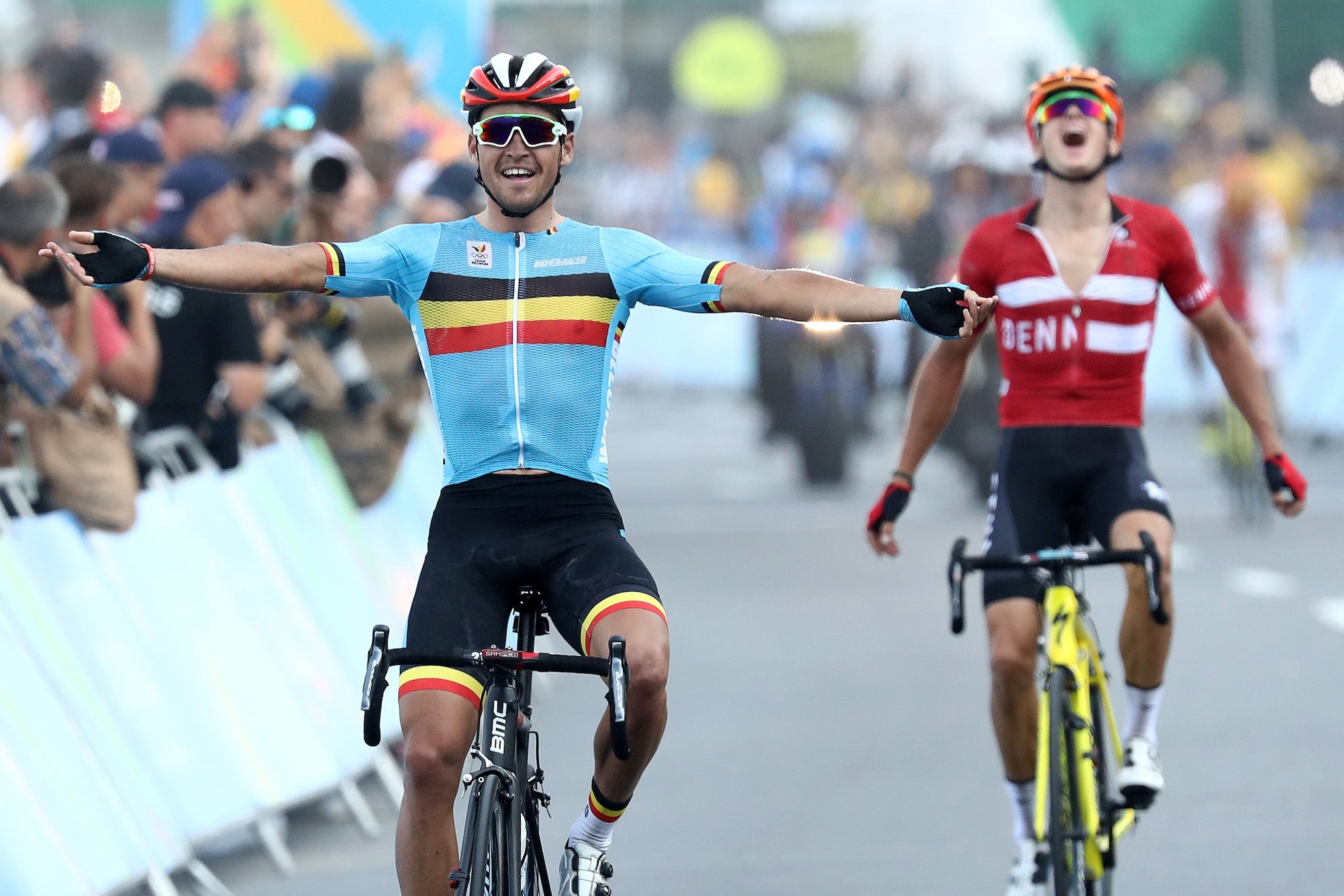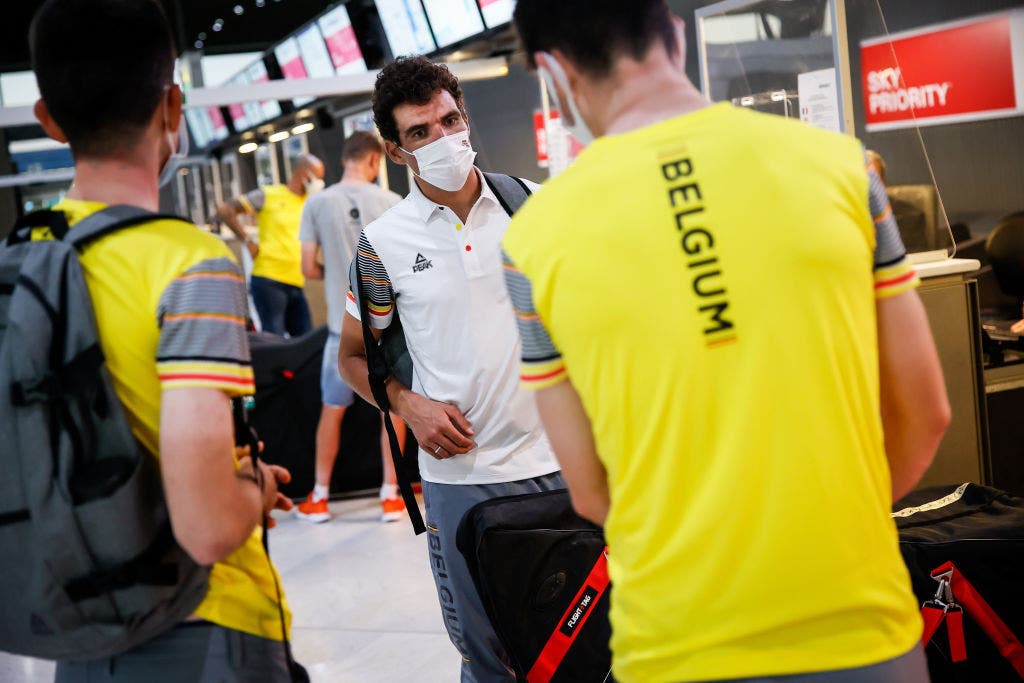How serious do the elite pro men take the Olympic Games?

Greg Van Avermaet's profile sky-rocketed after he won the Olympic gold medal. (Photo: Getty )
How serious do the elite pro men take the Olympic Games?
A lot more than ever before.
When the elite pros started racing the Olympic Games in 1996, there was a sense that the Olympics represented little more than just another race day.
Sure, if you won, it’s a big deal. What really matters, at least for the top pros racing in Europe, is the Tour de France, Paris-Roubaix, or the world championships.
After all, that’s what they get paid to do.
Also read:
That might have been the case 25 years ago, but how the pros approach the Olympics and what they think of the Olympic road race and individual time trial has shifted dramatically since 1996.
Just ask Alejandro Valverde, a rider who’s won many of pro racing’s most important races, including Liège-Bastogne-Liège, the Vuelta a España, and the rainbow jersey.
“It’s obvious the Tour is the most important race there is,” said Valverde, starting his fifth Olympic Games. “But in the Olympic Games, you’re representing your country, and a victory there will last forever. So if I had to choose between the two, I’d take the Olympics.”
Also read: One last romp for Valverde?
That sentiment reflects an important shift inside the elite men’s peloton. The Olympic Games are no longer an afterthought.
And for the winner, an Olympic gold medal can change their lives forever.
Slow road from amateurs to professionals

The allure of Olympic gold took awhile to grip the elite men’s peloton.
The Olympics were, at least until 1996, the realm of amateurs.
Riders would postpone turning pro to have a shot at Olympic glory. Eddy Merckx and Lance Armstrong were among legions of riders who waited to race the Olympics before starting their pro respective pro careers (neither won gold).
By 1996, the Olympics were looking to expand their reach globally, and decided to allow professional athletes — arguably the best in class — to compete in the Olympic Games.
Also read:
That created a seismic shift with how cycling was organized. The amateur status was eliminated, and the UCI created the junior and U-23 categories to fill that space. Pros could now chase Olympic gold.
Yet in the first few Olympic cycles, the professionals still put Europe’s biggest races on the highest pedestal.
Part of it was tradition, another more practical. Riders were paid by trade teams — not national governing bodies — so the European races took precedent.
That started to change as top pro riders discovered the upside of striking gold.
“The Olympic medal means a lot,” Van Avermaet said. “Everyone knows I would love to win the Tour of Flanders, but would I change my Olympic medal for Flanders? Definitely not.”
In 2012, Bradley Wiggins became the UK’s first Tour de France winner, but it was his gold medal in the individual time trial — eight Olympic medals in total on track and road — that shot him into superstar status and earned him his knighthood.
Today, “Sir Wiggo” transcends professional cycling, thanks in large part to his Olympic success.
Balancing ambitions in an Olympic year
For a long time, many top pro teams saw the Olympic Games as an inconvenience.
The racing calendar would be jiggled to make space for the Games, and riders would need their training and racing schedules to be adjusted. Some teams didn’t like it.
Tadej Pogačar didn’t leave the Tour de France early to prepare for the Olympics for obvious reasons.
Michael Mørkøv, for example, is one of the best track cyclists in the world, but his responsibilities to Deceuninck-Quick-Step came first. Mørkøv, set to race the Madison as the event returns to the Olympic cycle, raced all the way to the Champs-Élysées as the ace lead-out man for Mark Cavendish.
Also read: Mørkøv and his 13-year Madison quest
And as soon as he’s done in Japan, Mørkøv returns to his full-time job, and will race the Tour of Denmark on August 8.
Michał Kwiatkowski, a former world champion who could perform well on the Tokyo road course, made it to Paris, and jumped on a flight just hours after the Tour ended.
“Of course, the Olympics are important, but they are only every four years,” Kwiatkowski said. “It’s a one-day race. Anything can happen. If you win, it obviously is very important. If you don’t, there are many more races still to come.”
Being an Olympian is a special experience for any athlete, but the Olympic Games are far from the pinnacle of professional cycling.
For many Olympic sports, that’s the opposite.
There’s no Tour de France for synchronized swimming or rhythmic gymnastics. For many Olympic athletes, the Olympic Games are the absolute peak of their athletic careers.
For most of the elite pro men, the Olympics can be a huge bonanza for anyone who wins, but the actual race remains well down on the prestige chart.
Putting the Olympics at the center of a season
Of course, there are pro riders who put the Olympics at the center of their season.
Valverde, for example, will lead Spain’s powerful five-rider team, and used the Tour de France as little more than a three-week training camp. His full-time employers, Movistar, were fine with that.
“I love being part of the Tour squad, and in the years ahead, I’ll go back in there and it will be the center point of my season,” Bennett said. “But the Olympics is a once in a career opportunity, and the course works for me. It’s hard, and will be very hot, which has always been my strength.”
Also read: Bennett and his Giro-Olympic dream
In fact, it’s often the historical connection to cycling or the Olympic Games that can shape a riders’ Olympic destiny and ambitions.
In Canada, for example, the Olympics are much bigger than the Tour de France, and an Olympic medal would have more significance to Woods within Canada than if he won Flèche-Wallonne.
Yet a rider can also be pushed aside by the gigantic size of the Olympic Games and each country’s unique media obsessions.
Kristin Armstrong, for example, won three consecutive Olympic gold medals in elite women’s individual time trial. That accomplishment, say in the Netherlands, would have made her a national hero. In the United States, where cycling remains a relatively fringe Olympic sport compared to swimming or athletics, her record didn’t enjoy its due.
“For New Zealanders, the Olympics are way more special than for say a Dutchman,” Bennett said. “In New Zealand, you don’t grow up around cycling, the Tour hardly even registers. But the Olympics, everybody knows them. They’re what you dream of when you’re a kid.”
In short, whoever wins the Olympic gold medal, it will be a very big thing.
For everyone else, it’s back to the day job as soon as it’s lights out at the closing ceremonies. The Vuelta beckons.